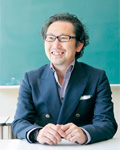
Style Co. Ltd.
Attainment of a friendly society for everybody
I learned the word "Multicultural Community Advancement Officer" the first time by chance from
a radio announcement of FM Gunma, and then I knew that the training opportunity for changing our
society to be livable and vigorous not only for foreign residents but for Japanese is provided by a
cooperative project of Gunma University and Gunma Prefecture. After working for interior sales for
11 years to improve the quality of life among local people, I enrolled in this program because I
wanted to make my home town, Gunma, more vibrant and livable.
In the lectures, taking out "concepts" from matters of common sense, I am learning to find the
essence or aspect behind them. I am excited and enjoying every minute of the lectures focusing on
find issues in which I had never experienced before. The methods I learned apply to meetings in my
company. I hope I can conduct "planning" and "implementation" based on the analytical ability
obtained in Analyst Courses for development of a friendly society for everyone living in Gunma
Prefecture.
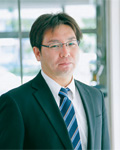
Social Welfare Chamber, Shibukawa City
Development of livable society that matches the features of local community
The reason why I took this training program is that I want to understand foreign people further
because I feel closer to the foreign residents in my district than before. In the lectures, we are able to
learn methods to identify and analyze multicultural situations in communities or workplaces, and
connect effective solutions to planning and implementation. I am in Analyst Course now and
learning culture differences and social systems through group work and field work with other
students, for town development featuring the strength of each community.
Learning further, I would like to search good methods for a secure life for both local Japanese and
foreign people and the creation of new employment that can be given back to the local community
through multicultural coexistence. In addition, I hope I can apply what I have learned in the program
to a livable community development that matches local features.
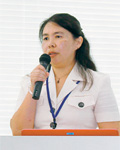
Ohta City Kuai Elementary School
Solve the issues in the community and connects person to person, and person to the organization
In the academic year 2009, I completed the Multicultural Society Coordinator Course at Tokyo
University of Foreign Studies. Since I wanted to apply the knowledge I obtained, I have been
involved with the local community. Then, I noticed that I did not have enough knowledge to
understand the actual conditions and issues in the community. Then I heard of this program and
applied it.
I was born and raised as a second generation Japanese Brazilian in Brazil. It has been ten years
since I found a job and started raising a family in Japan. It is impossible to think about multicultural
society without remembering my experiences of my family and myself. My parents live in Brazil as
foreign residents. And I live in Japan as a foreigner. Looking back on what I have experienced, I
have started this training program.
I hope I can solve the problems in the community I live in now, and put my efforts into connecting
each person with others and organizations.
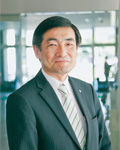
Financial Planner (CFP® Certified)
Becoming a Multicultural Community Advancement Officer who contributes to community
When I was about to complete a one year program of Gunma University "Industry-University
Collaborative Satellite Graduate School" as a student in the academic year 2010, I found the student
recruitment of this training program. I never had a chance to interact with foreigners in my daily life
and what I realized was that there are many foreign laborers in Ohata City and Oizumi Town. To me
the word "Multicultural Coexistence" is pleasant surprise. Also, knowing their goal, "to train human
resources who can vitalize the local community", I thought I could be one of those human resources
and contribute to the community.
Facing overseas advance, expansion of international trade and employment of foreign labor
workers, as a bank officer, I hope I can be a help for the development of small and medium-sized
enterprises from a standpoint of "Multicultural Coexistence"
In addition, learning about the actual conditions of foreigners through lectures and field work, I
have noticed that I have a possibility to help them as a financial planner. I will put more effort into
the program to become a "Multicultural Community Advancement Officer" who can contribute to
the local community.
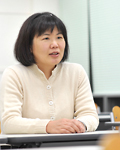
Social worker
Toward wider social actions through cooperation.
I took this course with the intention to learn new things. I have few opportunities to contact with foreigners in my life, and I did not consider multicultural problems as an immediate problem. As I learned more, I focused on their viewpoints as citizens, not as foreigners, and I began to feel that it was necessary to consider multicultural problems as being a member of one community. This program is comprised of "static" learning in which data is collected and analyzed and "dynamic" learning in which we go to the site to assess conditions. The "static" and "dynamic" learning gave me a profound scientific understanding of the actual conditions of Gunma Prefecture. I could exchange opinions with my peers through discussions which went beyond age and profession, and I could rethink my own philosophy.By considering problems related to a multicultural community, I continue to seek methods to resolve the problems so that people of foreign nationality could live as local residents, all people in the area could live in cooperation with each other, and a barrier-free society could be created. Although the power of one person is small, the more I understand the contents of this program, the better cooperation I can achieve, which could lead to wider social action
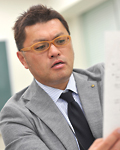
Sales Department Division 3 - Account Planner
Leading to the establishment of an environment of a high quality of life and the resolution of problems in the community.
I determined to take this training program in compliance with the policy of my work place. My company basically provides advertising services. In the past several years, regional activation projects in cooperation with communities and public administrations and services related to infrastructure development have increased.In this program, I can learn of cases of multiculturalism coexistence to be followed in Japan and overseas as well as get opinions from other participants from different industries, which is an advantage. The lectures are given by highly-professional lecturers, and as a member of society there are many parts that I understand, and I see that the lectures are very meaningful. I often had good results from applying the information and know-how that I got during lectures to actual operations.
For the future, I will contribute to establishment of an environment of a high quality of life and the resolution of problems in the community by better understanding multicultural coexistence.
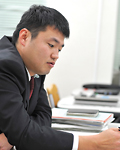
Central Sales and Management Division Vortex Seigun Co., Ltd.

